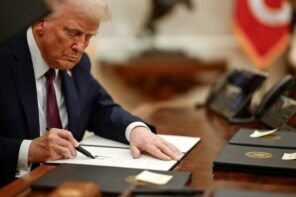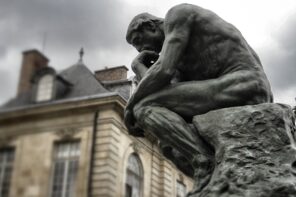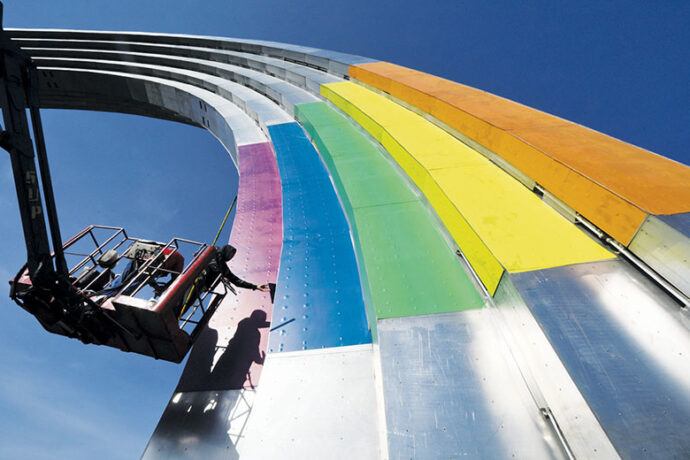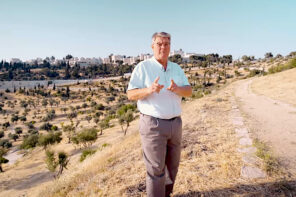Wednesday, May 17 will be commemorated around the world as International Day Against Homophobia and Transphobia.
Ukraine: Eurovision sparks conflict With Orthodox Church over rainbow arch
AFP’s Olga Shylenko wrote about the contradictions around this year’s Eurovision being held in Ukraine’s capital Kiev:
Ahead of the Eurovision Song Contest final in Kiev, an extravaganza embraced by the LGBT community, Ukraine’s “Celebrate Diversity” motto sounds more like wishful thinking than a fact of life.
Weighed down by a restrictive Soviet heritage but filled with lofty European aspirations, the crisis-torn east European country hopes to use the global spotlight to showcase its tolerance of values long-cherished in the West.
Yet beneath the liberal facade put on by the city, which wants fans at Saturday’s final to celebrate “our unique differences,” resentment and anger has brewed among thuggish far-right groups and powerful clerics who treat homosexuals with disdain.
And while the Kyiv Pride LGBT rights group distributes maps of gay-friendly places tucked in the shadow of Orthodox churches, beatings of homosexuals are routine and even the prime minister shudders at the thought of legalising same-sex marriage.
Shylenko reports that a project to plaster a giant Soviet-era arch with the rainbow colors was abandoned partway due to opposition from Red Rektor, an ultranationalist group and the Orthodox Church:
Father Feodosiy of the dominant Ukrainian Orthodox Church warned that Kiev’s rainbow arch could jeopardise the country’s entire social value system.
“There will be inevitable consequences for the entire nation if this ideology and these sins are spread everywhere with the help of such an enormous symbol,” he told AFP.
But Ukrainians like Zoryan Kis, a gay LGBT activist, called the nearly-completed rainbow arch a “perfect metaphor of ‘celebrating diversity’ in Ukraine”.
Russia boycotted Eurovision after the Ukrainian government refused to allow the Russian contestant into the country because she had performed in Crimea after Russia’s annexation.
Indonesia: Prosecutor recommends 80 lashes for gay men
A prosecutor has recommended a punishment of 80 lashes for two men who were arrested in March after vigilantes stormed into their apartment while they were naked. Human Rights Watch denounced the sentence. From HRW’s Kyle Knight:
Everything—from the snooping, to the Sharia squad tip-off, to the flogging sentence—is in accordance with the law in Aceh. Aceh is a devoutly Islamic province in the world’s largest Muslim country, that likes to proclaim itself moderate. It is led by a president who touts diversity and pluralism, but who has failed to back that rhetoric with protection for the rights of beleaguered minorities.
Aceh’s position within the republic is unique. A 30-year separatist conflict seeded deep distrust between Acehnese and the national government. The 2004 Boxing Day tsunami led to a ceasefire that soon ended the war but wrought unprecedented devastation from which the province has not recovered. The 2005 peace agreement ensured Aceh’s “special status,” making it the only one of Indonesia’s 34 provinces that can legally adopt bylaws derived from Sharia (though such provisions, modeled on Aceh’s, are spreading nationwide).
Over the past decade, Aceh’s parliament has gradually adopted Sharia-inspired ordinances that criminalize everything from non-hijab-wearing women, to drinking alcohol, to gambling, to extramarital sexual relations. The province’s 2014 Criminal Code bars both male and female same-sex behavior. Under its Sharia ordinances, Aceh imposed cane lashing against 339 people in 2016; a punishment recognized under international law as torture.
To make matters worse, local government officials have aggressively stoked homophobia. …
Knight writes that Indonesia “has historically been a unique beacon of tolerance for LGBT people in Southeast Asia.” But that is changing:
But that tolerance has proven fragile in the face of government-fueled animus. Anti-LGBT incidents across Indonesia have significantly increased since January 2016—in synch with broader rising intolerance of religious minorities. Last year’s LGBT crisis started with vitriolic anti-LGBT rhetoric from officials and politicians and included police raids on suspected gatherings of gay men, and attacks on LGBT activists.
Russia: Gay teen reportedly pushed off Chechen building; Russian Gov’t dismisses ‘propaganda’
According to some news reports, a gay Chechen teenager was pushed off a nine-floor balcony by his uncle. Efforts by the Russian LGBT Network to help gay men escape from the anti-gay violence in Chechnya were featured on an NPR report with David Greene. The Independent reports, “Police reportedly told parents of gay men to ‘sort it out’ or the state will intervene.”
Five activists were arrested in Moscow on Thursday trying to deliver petitions signed by more than 2 million people calling on government officials to investigate the anti-gay violence in Chechnya., reports BuzzFeed’s Lester Feder.
The Russian Embassy in Israel told the Haaretz newspaper that it had done an investigation and found “not victims of persecution, threats, or violence.” In a letter to the Embassy, Russian officials called the allegations part of “a propaganda campaign against Russia around the world, including in Israel.
Earlier this month, gay-rights activists joined nationalists, socialists, and other groups in an anti-Putin protest.
UK: Queer Britain BBC series asks, ‘Does God Hate Me?’
The first episode of Queer Britain, a six-part series appearing on BBC Three, asks, “Does God Hate Me?” The episode was published on YouTube this month. From the BBC’s description:
Riyadh Khalaf explores the relationship between someone’s faith and sexual identities.
In this episode, Riyadh meets a dis-fellowed Jehovah’s witness, a Muslim woman seeking a marriage of convenience, and trans-masculine Christian, Elijah, as he is renamed in church.
Australia: ‘Devout Christian’ protests marriage equality advocacy with pie in face of Qantas CEO
A retired farmer and “devout Christian” who smashed a lemon meringue pie in a business leader’s face during a public breakfast, was charged with assault, trespassing and damage. Alan Joyce, Qantas CEO, is gay and the company has been supportive of activists calling for legal marriage equality. Tony Overheu, the wielder of the pie told police he was protesting his target’s stance in favor of marriage equality:
“I’ve never done that sort of thing, I’m a law-abiding person, but I think this is part of inevitable pushback.
“When the community is grumpy, figures who are overstepping the line have got to anticipate there will be pushback in some shape or form. The broad community have had a gutful.”
Overheu has apologized.
In other news, the state parliament of Queensland apologized to men convicted under old sodomy laws and introduced legislation to throw out their criminal records, reports AP.
Singapore: Government bans foreigners from participating in or observing Pink Dot celebration
We have previously reported that the government of Singapore had banned foreign companies from contributing to Pink Dot, the annual LGBT pride celebration, and 100 local companies stepped in to offer financial support. On Sunday organizers announced that the government had taken another step: only Singapore citizens and permanent residents will be allowed to attend. The police explicitly warned that foreigners may not even observe; showing up at Speaker’s Corner could leave one open to a fine up to $10,000 and 6 months in prison.
Hong Kong: Judge says civil servants married overseas entitled to benefits
A judge ruled that civil servants who get married overseas to their same-sex partners are entitled to the same rights and benefits as man-and-woman married couples.
Bermuda: Government will not appeal marriage equality ruling; cruise lines anticipate wedding boom
The government announced that it will not appeal a Supreme Court ruling earlier this month in favor of marriage equality. The Royal Gazette reports that the ruling is also “expected to impact the numerous cruise lines that fly the Bermuda flag, including Cunard, Princess and P&O cruise ships.” In 2015, the Royal Gazette reported on a lesbian couple who were told they could not marry aboard a P&O ship because it was registered in Bermuda. In 2016, religious conservatives campaigned for “no” votes on a marriage referendum; they won more than 60 percent of the vote but since turnout fell below 50 percent it was not considered legally valid.
Malta: Marriage equality becomes campaign issue
The government of the Catholic-majority country introduced civil unions in 2014. Now Prime Minister Joseph Muscat is promising to introduce marriage equality if his Labour party is returned to power, and the opposition Nationalist Party announced it will not try to roll back civil unions. The Nationalist Party’s leader has publicly stated his support for marriage equality, and the party’s youth wing is “petitioning the party to include full marriage equality in its manifesto,” reports Malta Today.
Colombia: Proposed referendum to ban gay adoption rejected
The Primary Commission voted to reject a proposed referendum seeking to ban adoption by same-sex couples.
Guyana: State pledges, then reverses, on support for referendum on decriminalizing homosexuality
Pink News reports that the government of Guyana, which bans same-sex sexual activity, will not hold a referendum on decriminalizing homosexuality as the government had told the Inter-American Commission on Human Rights it would do rather than bringing a repeal before the legislature.
Guam: In face of lawsuit, government agrees to allow two women’s names on birth certificate
Two women who were married in New York City challenged a government registrar’s refusal to include both women’s names on their daughter’s birth certificate. As the case was going to court, the government said they would agree to list both women on the birth certificate but would not pay their legal fees, a decision they are challenging.
Taiwan: Ruling on marriage equality expected next week
A ruling in a marriage equality case is expected on May 24; it could clear the way for same-sex couples to get married.
Mexico: Some officials in Michoacán refuse marriage licenses in spite of legal change
Some civil registry officials in Michoacán are reportedly continuing to refuse marriage licenses to same-sex couples even though the state legislature changed its Family Code last year to include marriage equality.
Paraguay: Presidential candidate pledges support for marriage equality
Finance Minister Santiago Peña, who hopes to become president, announced his support for marriage equality. A gay activist leader quoted by Hoy praised the move, saying that Paraguay is behind other Latin American countries in protecting LGBT citizens. “The main obstacle to approving bills that protect LGBT people in prejudice,” he said, “which is not annulled or changed by laws, but must be made through a cultural change.”
Canada: Stamp marks marriage equality as milestone in country’s history
A postage stamp commemorating marriage equality is one of ten being released to celebrate the country’s 150th birthday. The series honors “10 milestones that together have helped shape the story of Canada.”
On another front, Gortnacul House presented “To Live With Moral Confrontation,” a paper on legal conflicts at the intersection of LGBT equality and religious liberty, at the annual conference of the Graduate Students in Law Association of the University of Ottowa. The conference theme was “Law at the Tipping Point: Conflicts, Challenges and Changes.”
Bosnia: LGBT protest protected by police
A protest against homophobia held by a “few dozen” people in Sarajevo on Sunday went off “without incident” thanks to have police protection, According to Gay.it.
Cambodia: Pride Week gets underway with call for marriage equality, nondiscrimination protections
Cambodia’s annual Gay Pride Week celebrations started on May 12. The Cambodia Daily reports that “a statement signed by 57 communities, organizations and businesses called on the government to legalize same-sex marriage and introduce laws to protect the LGBT community.
Japan: Tokyo Pride drawns 6,000
Tokyo’s LGBT pride celebration on Sunday May 7 drew an estimated 6,000 people.
Israel: Tel Aviv pride will have bisexual focus
Organizers of Tel Aviv’s Pride celebration, one of the world’s largest, announced that this year’s parade will focus on bisexuality. The event will take place between June 3 and June 9.











